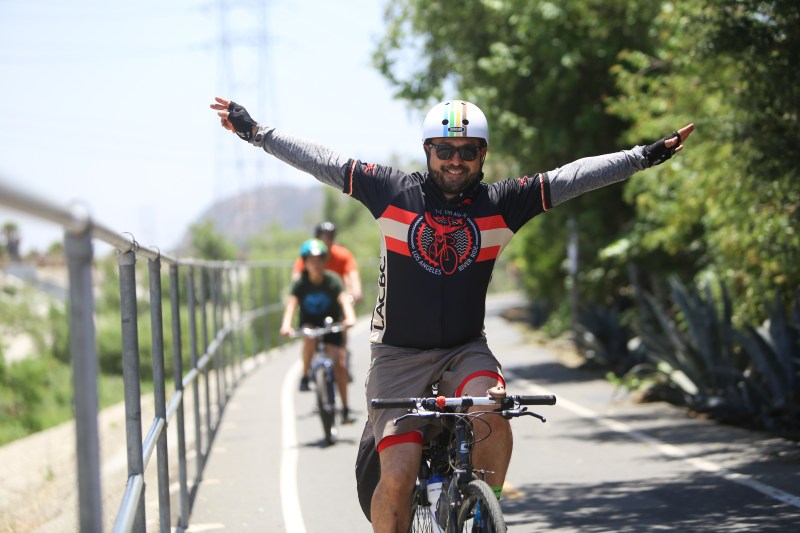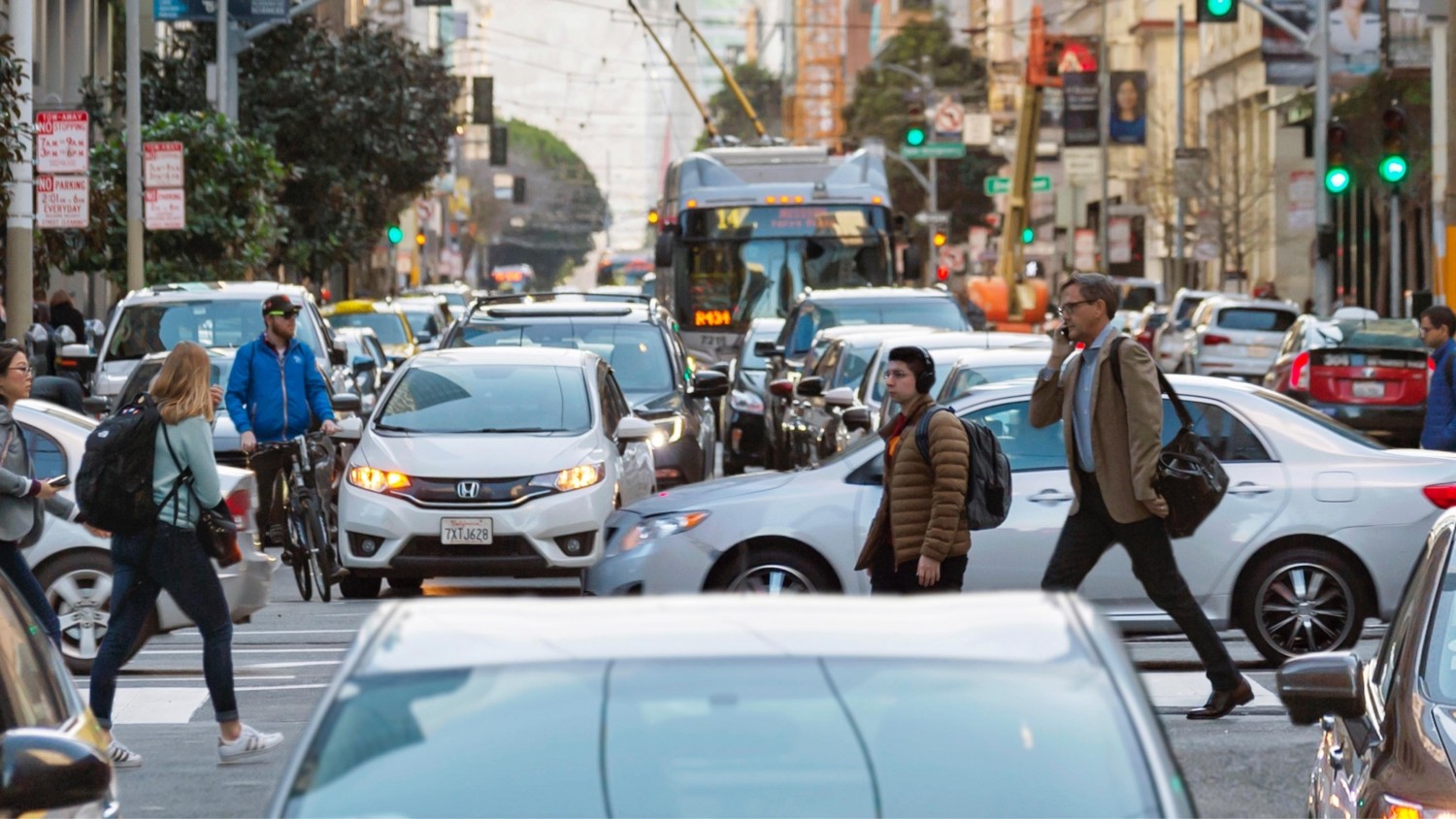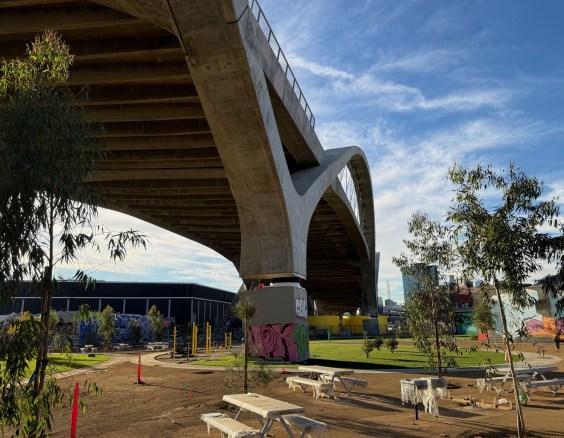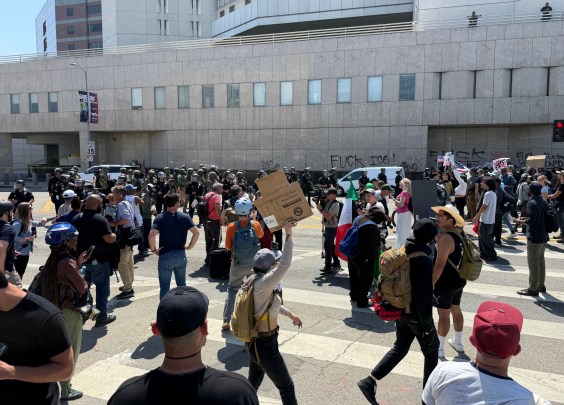Yesterday, the L.A. County Bicycle Coalition announced that Eli Akira Kaufman is now the organization’s new executive director. Kaufman studied at UCLA and Oberlin College. In recent years, Kaufman has worked for Film Independent, GOOD, and River L.A., as well as Swell Creative Group, where he helped produce the successful campaign to pass Measure W, the countywide clean water parcel tax.
Streetsblog L.A. caught up with Kaufman this week, conducting this interview via email.
Streetsblog: Tell us a little about your background. Where are you from? What education and experience has shaped you?
Kaufman: I’m a father of a ten-year-old boy and four L.A. street dog rescues. We live in Mid-City, just east of Little Ethiopia, with my fiancé, a professional dressage horse trainer. So yes, it is possible for bike people and equestrians to live happily together!
The way I engage the world is by listening carefully to the experiences of others to to gain insight on what matters for the greater good. A graduate of UCLA School of Film, I’ve spent my career in the social justice space, working at organizations like Film Independent, GOOD Magazine, A Hundred Years, River L.A., and Swell Creative Group.
My experience has taught me that leadership is more than a role: it is a practice. My approach to leadership is rooted in collaboration, deep listening, and hands-on engagement with the communities I serve. I believe that transforming the transportation profile of Los Angeles requires actively engaging the people that are most directly impacted, including those who don’t yet see themselves as transportation advocates.
How do you get around? Perhaps include: what kind of cyclist you consider yourself, where you typically bike, and/or what kind of bike you ride?
I consider myself an omnivore commuter, I like to bike commute as often as possible, sometimes opting for a combo ride with Metro. As I’ve yet to find a way to fit a bag of soccer balls or a kayak in my panniers, I use a car when coaching my son’s AYSO soccer team or when I head to the Los Angeles River for a paddle.
I have an old Cannondale, but ever so often you’ll catch me on my forest green Slingshot (the DeLorean of 90’s mountain bikes). I always enjoy taking part in CicLAvia and LACBC’s Annual L.A. River Ride. My favorite place to ride for fun is along the Los Angeles River Path.
The L.A. County Bicycle Coalition, especially under the recent leadership of Tamika Butler, has done a lot to bring equity to the forefront of bicycle advocacy. How do you plan to ensure diverse voices are always at the table, to maintain and continue to build trust with communities of color and lower-income communities?
I am excited to build on the mobility justice advocacy Tamika brought to LACBC by continuing the approach of doing with, and not for. For me, this starts with listening and learning from people who are the most directly impacted by L.A.’s unsafe streets: historically women, children, and people of color. While at River L.A. I designed and hosted a picnic series called “A Seat at The Table.” We invited neighbors to break bread on the banks of the Los Angeles River, and share what the river means to them today and their vision for what the river could be in the future. Conversations like these aren’t always easy to have, but they are essential to cultivating understanding and trust.
A big reason I’m excited to join LACBC is because I connect with the values and approach that has been cultivated here over the past twenty years. I’m proud to help lead projects like Active Streets L.A., which places local residents in charge of assessing, redesigning, and deciding what their streets should look like. We’re also building out our Neighborhood Bike Ambassador program, and working to create trainings for our volunteers and our 13 chapters to foster the growth of leadership among community members.
On the policy side, our Advocacy Team is organizing with individuals and grassroots organizations like L.A. CAN and Urban Peace Institute, to connect local changemakers to those in office so community-led projects become the new norm. We’re also applying pressure to city and county agencies by speaking out when they fall short of their promises, as well as celebrating them when they succeed in creating access to safer and more equitable transportation options. In addition, we’ve been active members in key intersectional coalitions, like the Alliance for Community Transit Los Angeles (ACT-LA) and the Los Angeles Regional Open Space and Affordable Housing (LAROSAH) collaborative which advocate for more sustainable and inclusive neighborhoods.
I’d love to hear your ideas for how to create a brighter and safer future for those who travel Los Angeles on wheels and by foot. You can reach me at eli[at]la-bike.org
There has been a vocal backlash against bicycling, Vision Zero, road diets and other safety improvements in recent years. How do you expect to advance bicycling in the face of hostility from some individuals, groups and even elected officials?
People are at the center of all the work that we do at LACBC. Whether we’re on foot, on a bike, or in a car, we’re all just trying to get to where we're trying to go. LACBC is committed to empowering our community, to sharing their stories, and to supporting local leaders in the mobility justice movement.
Making our streets safer for the most vulnerable populations will improve the transportation experience for us all. But for me and the staff at LACBC, it starts with how we show up for and support the mobility needs of low-income Angelenos, families, and people of color.
We’re designing our education and outreach programs to invite every segment of the transportation ecosystem to participate. To learn how their personal transportation needs are informed by, and connected to, the transportation needs of others. LACBC is building a culture of “calling in,” versus “calling out,” and empowering our safe streets advocates to do the same. The one thing we know for sure is that we can’t accomplish our goals alone, and we need as many diverse voices at our table as there are in Los Angeles.
What’s your top priority agenda for LACBC for the year ahead? For the next five years?
First, I plan on doing a listening tour with staff, board, partners, volunteers, and community members. I want to spend to time learning, understanding, and getting a sense of LACBC’s place in this complicated landscape.
Next comes a strategic planning process with the board and staff, which was begun under the leadership of Interim Executive Director Janet Schulman. We’ll set goals, priorities, and hone in on our shared values to better shape the future of LACBC. Of course, our goals need to be properly funded, so I’ll be hitting the ground fundraising to ensure that our programs have the resources they need to succeed.
For the next five years, we will continue to expand our partnerships, build our connections with the community, empower mobility justice leaders, and advocate for a people-first perspective that supports a better Los Angeles.
This is the question SBLA typically ends interviews with. If you had a magic wand and, overnight, could change any aspect of Southern California mobility, bikeability, or livability, what would you change?
I’d use my wand to make every person in L.A. see that we are all in this together: no matter who we are, where we live, or how we navigate our region. We all need to figure out how to share space, our roads, and the responsibility for creating better transportation options in Southern California. LACBC will continue to advocate for strong leadership from within our ranks and beyond to support safe and inclusive streets for all road users. We’re working to support community-driven complete street improvements that empower and connect us, and we need everyone in to succeed. We hope you will join us.
Anything else you’d like to tell SBLA readers?
More than anything, I am grateful to be joining LACBC as Executive Director to help build a future that serves the needs of our region for generations to come. I can’t wait to see what we can accomplish together.
Once again, if you have any ideas, suggestions, or just want to say “Hi,” drop me a line at eli[at]la-bike.org!






